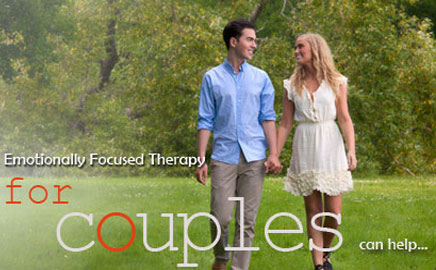Couples Counselling
A close connected relationship is healthy for you. Besides the comforts that a nurturing relationship produces, researchers have found that a sense of secure attachment has been linked to improved immune system functioning, better recovery from illness and injuries, and more effective management of stress.
Perhaps you have been struggling in your relationship and have begun to feel hopeless. Perhaps you have been feeling distant and less loving in your relationship, and want to reconnect with your partner.
Perhaps you are ready to take the first step in seeking help. If so, please consider contacting me to discuss how I might be able to assist you. I believe in getting to the heart of the matter and will do my best for you and your partner’s relationship.
I will help you stop the dance of blame, distancing and mutual hurt. We will break out of the negative cycles that had become your enemy and will explore and learn new ways to achieve closeness and connection.
About Emotionally Focused Therapy for Couples
Do you feel lonely in your relationship?
Do you and your partner have the same arguments over and over again?
Do you long to be in a relationship where you feel close and connected with your partner?
Emotionally Focused Therapy can help.
Emotionally Focused Therapy (EFT) is based on attachment theory which states that everyone has a need to feel close and connected with others. This is especially true with our partner. When partners feel insecure and/or distant from each other, they can get caught in negative, self-reinforcing patterns of interaction. In these patterns, both people hide their deeper feelings such as hurt, sadness, loneliness, or fear and instead show defensive feelings of anger or indifference. This results in both parties seeing only the outward expressions of hostility or apathy in the other, which creates distance between them. EFT helps break these negative cycles of interaction and establish a safe, secure bond where couples feel close and connected with each other. As intimacy deepens, EFT helps couples end the loneliness and pain in their strained relationships.
Problems such as poor communication, pain of infidelity, lack of intimacy and lost feelings of love can be solved by creating a deep level of trust and closeness in the relationship.
Relationship distress is the single most common reason for seeking therapy. It undermines family functioning and is strongly associated with depression, anxiety disorders, post-traumatic stress, substance abuse and alcoholism. These symptoms can result in chronic illness and also have a profound effect on workplace functioning.
EFT offers a comprehensive theory of adult love and attachment as well as a process for healing distressed relationships. It recognizes that relationship distress results from a perceived threat to basic adult needs for safety, security and closeness in intimate relationships.
This experiential / systemic therapy focuses on helping each partner reprocess the emotional experience underlying the rigid negative interactional patterns that keep them stuck. Through a series of well-defined stages the therapist takes the couple from negative cycles such as pursue-withdraw and criticize-defend to new cycles of bonding interactions. These positive cycles then become self-reinforcing and create permanent change. The relationship becomes a safe haven and a healing environment for both partners.
EFT is a relatively short term process – most couples notice changes within the first ten sessions. Weekly sessions build momentum and leads to more effective results. Within six months, couples can expect many positive changes.
Some of the results commonly seen in EFT are:
- Couples are better able to address conflict.
- Couples rediscover the connection in their relationship.
- Couples recharge, re-engage, re-energize, restore, resolve and resurrect all the positive aspects of their relationship.
- There is a new focus on the “emotional bond” of the relationship.
- Couples reshape the old “negative pattern” that was not working for them, while discovering the root of the issues.
- Couples begin to foster connection on their own and are able to weather future conflicts and challenges.
EFT is effective. According to research findings:
- 90% of couples reported significant improvement in their relationship;
- 70-73% reported complete absence of distress at the end of therapy; and
- Trends indicated relationships continued to improve after therapy ended.
"I credit EFT for the wonderful success many of my clients have enjoyed in achieving close, connected relationships."
~ Brenda Gibson M.Ed, RSW, CCC
For more information about EFT, please refer to the following link:

